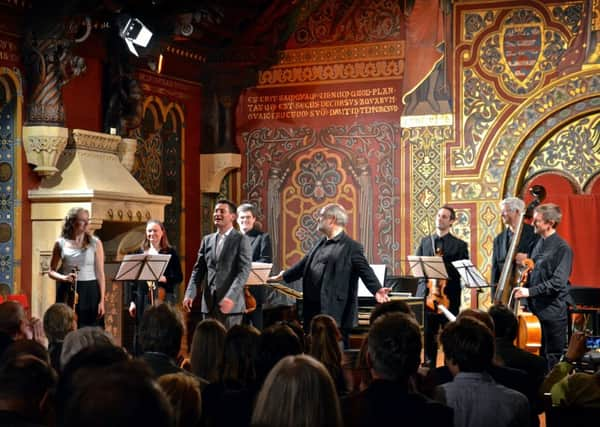Bach to the source with The Dunedin Consort


Now and again a critic gets a rude awakening. It happened to me last week in the German state of Thuringia, a mecca for Bach aficionados. On Good Friday, in Weimar’s Herderkirche which Johann Sebastian Bach would have frequented while employed at the nearby Weimar court, where his son CPE Bach was baptised exactly 300 years ago, and which houses the stunning altarpiece of Lucas Cranach – I witnessed Bach’s St John Passion, presented in the context of Lutheran liturgical practice, in which organ chorale preludes by Bach, sung congregational chorales, and a motet by Jacobus Gallus provided a framework for the main work.
It was a sell-out event during the opening week of Thuringen Bachwochen, a festival that takes place around Easter in the various towns where Bach lived and worked, and which knows its onions when it comes to booking the very best Bach exponents and interpreters. And the rude awakening? This Good Friday performance, world class by any standards, was by Edinburgh-based Dunedin Consort under its indefatigable director, John Butt. Do we in Scotland truly appreciate the unique balance of scholarship and practical flair Butt and his small team of singers and period instrument practitioners bring to performances of such music? Not enough as yet, I fear.
Advertisement
Hide AdTravelling with them on this Easter weekend tour of Weimar and the imposing Wartburg Castle, set high above Bach’s birthplace in Eisenach, reminded me that the Consort is a very different animal from the mixed voice a cappella Scottish version of the King’s Singers it started out as under co-founders Ben Parry and Susan Hamilton in the 1990s.
Under Butt – now sole artistic director – the introduction over recent years of high-calibre period instrument players has repositioned the Dunedin as a serious Scottish rival to, say, England’s long-lived Academy of Ancient Music.
The Passion performance in Weimar was moving and exhilarating. The forces were small, just as in the pre-tour performance at Perth’s St John’s Kirk, and just as Bach would often have had: eight singers, with soloists from the ranks, and a 14-strong period band with Butt himself directing from the harpsichord.
“There was a woman behind me in tears,” Butt told me later, and the emotion and drama in his interpretation was certainly gripping, thanks to the excitable spontaneity of the central Evangelist’s narrative role (euphoric and compelling from Scots tenor Thomas Walker); the calm humanity of Jonathan Sells’ Jesus; the awestruck luminosity of soprano Joanne Lunn; and the intimate colours of the instrumentation, among them Jonathan Manson’s silken gamba counterpoint to Margot Oitzinger’s alto aria Es ist vollbracht!
But above all, there was a sense of place. For there is something spiritually dynamic about the rudimentary flamboyance of these Lutheran churches – the austere Protestantism of the rigid public pews versus the Baroque flamboyance of the sanctuary carvings and paintings – into which the expressive intellectuality of Bach’s music fits like a glove.
And for John Butt, professor of music at Glasgow University and one of the world’s leading Bach scholars, performing right at the heart of Bach country is one step short of heaven. “It’s a bit like bringing coals to Newcastle,” he admits. “But there’s an unbelievable connection when you’re performing Bach’s music in a building where one of his children was baptised. And I believe we’re doing something worthwhile in bringing a fresh approach to those already steeped in the Bach tradition.”
Advertisement
Hide AdOddly, the idea of participation seemed to throw the Weimar audience, whose congregational singing was flavoured with awkward uncertainty. “These hymns are familiar to them, but for some this part-liturgical reconstruction would have been slightly unsettling,” Butt believes.
It’s that level of research-based innovation, coupled with Dunedin’s charismatic presentation style, that ensured this repeat visit to the Thuringen Bachwochen. Festival director Christoph Drescher recalls the popularity of Dunedin’s first appearance two years ago. “I was so impressed by their recordings, I invited them to open the 2012 programme in Eisenach with the St Matthew Passion,” he says. “Naturally there were many of the top Bach specialists there, one of whom said to me ‘I have listened to probably a thousand performances of that work, but this is the one that really touched me’”.
Advertisement
Hide AdThe same reaction greeted this year’s St John Passion, after which Dunedin completed its Festival residency with a vivacious instrumental recital at the Wartburg, the Eisenach hilltop castle that provided sanctuary for local boy Martin Luther while he famously translated the bible.
Again, the performances of Bach, Biber and Telemann were paragons of stylistic authority, especially in combination with guest blockflöte (recorder) soloist Maurice Steger, whose swaying, energetic virtuosity in the Telemann concertos was utterly breathtaking.
With such a successful tour behind it, and having just notched up yet another “Record of the Month” from BBC Music Magazine, this time for its recording of Mozart’s Requiem, it’s back to Scotland for Dunedin, and a series of projects that include a Monteverdi programme in May, and plans to extend its award-winning Linn Records association with a new recording of Bach’s Magnificat in the original E flat major version.
What I saw in Germany was a Scots-based ensemble that presents originality of thought and musical adventure in a world class, world-leading context. The past four years have been difficult, as new chief executive (and viola player) Alfonso Leal del Ojo and his board have addressed previous administrative weaknesses and funding problems. But if standards count for anything, the Dunedin Consort deserves every bit of backing it can get. No question.
• The Dunedin Consort presents Monteverdi: Madrigals of Love and War, King’s Chapel, Aberdeen, 10 May and Queen’s Hall, Edinburgh, 11 May. www.dunedin-consort.org.uk